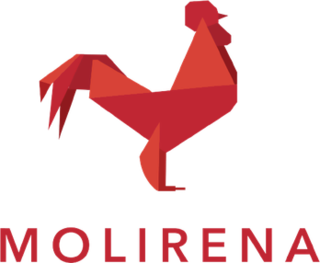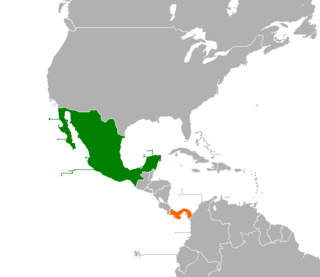Related Research Articles

Manuel Antonio Noriega Moreno was a Panamanian politician and military officer who was the de facto ruler of Panama from 1983 to 1989. He never actually served as president of Panama, instead ruling as an unelected military dictator through puppet presidents. Amassing a personal fortune through drug trafficking operations by the Panamanian military, Noriega had longstanding ties with American intelligence agencies before the U.S. invasion of Panama removed him from power.

Arnulfo Arias Madrid was a Panamanian politician, medical doctor, and writer who served as the President of Panama from 1940 to 1941, again from 1949 to 1951, and finally for 11 days in October 1968.

Guillermo David Endara Galimany was a Panamanian politician who served as the president of Panama from 1989 to 1994. Raised in a family allied to Panameñista Party founder Arnulfo Arias, Endara attended school in exile in the United States and Argentina following Arias's removal from power. Endara later received a law degree in Panama. He subsequently served as a member of Panama's National Assembly, and briefly as a government minister before heading into exile again following Arias' third overthrow.

The Nationalist Republican Liberal Movement is a centre-right conservative-liberal political party in Panama.

The People's Party is a Panamanian Christian democratic political party. Founded in 1956, it was made up of middle-class professionals, intellectuals and students, with support from trade unions, particularly the Federation of Christian Workers. It went on to become one of Latin America's most conservative and anti-communist Christian democratic parties. The ideological foundation of the party is based on the social doctrine of the Catholic Church. The PP is a full member of the Christian Democrat International and Christian Democratic Organization of America.

Eric Arturo Delvalle Cohen-Henríquez was a Panamanian politician. He served as Vice President under Nicolás Ardito Barletta. Following the disputed 1984 election, and after Barletta's forced resignation, Delvalle served as President of Panama from 28 September 1985 until 26 February 1988.

Nicolás Ardito Barletta Vallarino is a Panamanian politician, served as its President from 11 October 1984 to 28 September 1985, running as the candidate of the Democratic Revolutionary Party (PRD) in the contested elections of 1984.
General elections were held in Panama on 6 May 1984, electing both a new President of the Republic and a new Legislative Assembly.

General elections were held in Panama on 7 May 1989, with the goal of electing both a new President of the Republic and a new Legislative Assembly. The two primary candidates in the presidential race were Guillermo Endara, who headed Democratic Alliance of Civic Opposition (ADOC), a coalition opposed to military ruler Manuel Noriega, and Carlos Duque, who headed the pro-Noriega Democratic Revolutionary Party (PRD).

Parliamentary elections were held in Panama on 28 September 1980, electing a new National Legislative Council.
Indirect presidential elections were held in Panama on 11 October 1978, electing a new President of the Republic.
Labor and Agrarian Party was a Panamanian right-of-center political party, founded in 1960.
Popular Action Party was a Panamanian political party.
Workers' Revolutionary Party was a Panamanian political party.
The Socialist Workers Party was a Panamanian Trotskyist political party.
Broad Popular Front was a Panamanian small left-of-center political party.
The Democratic Action Party was a Panamanian conservative political party.
Ricardo Arias Calderón was a Panamanian politician who served as First Vice President from 1989 to 1992. A Catholic who studied at Yale and the Sorbonne, Arias returned to Panama in the 1960s to work for political reform. He went on to become the president of the Christian Democratic Party of Panama and a leading opponent of the military government of Manuel Noriega. In 1984, he ran as a candidate for Second Vice President on the ticket of three-time former president Arnulfo Arias, but they were defeated by pro-Noriega candidate Nicolás Ardito Barletta.

The nations of Mexico and Panama established diplomatic relations in 1904. Both nations are mutual members of the Association of Caribbean States, Community of Latin American and Caribbean States, Latin American Integration Association, Organization of Ibero-American States and the Organization of American States.
The Panama Truth Commission was appointed by Panamanian president Mireya Moscoso in 2000 to investigate crimes committed under the military rule of Omar Torrijos and Manuel Noriega.
References
- ↑ The Dictionary of Contemporary Politics of Central America and the Caribbean. Gunson, Phil.New York, NY: Academic Reference Division, Simon & Schuster, 1991. Pp.299.
- ↑ Political Handbook of the world, 1993. New York, 1993. Pp. 637.
- ↑ The Dictionary of Contemporary Politics of Central America and the Caribbean. Gunson, Phil.New York, NY: Academic Reference Division, Simon & Schuster, 1991. Pp.299.
- ↑ Political Handbook of the world, 1993. New York, 1993. Pp. 637.
- ↑ Panama : a country study / the American University, Foreign Area Studies; edited by Richard F. Nyrop. Washington, D.C. : The University : For sale by the Supt. of Docs., U.S. Govt. Print. Off., 1981. Pp. 154.
- ↑ Electoral Tribunal Archived 2010-01-19 at the Wayback Machine
- ↑ The Dictionary of Contemporary Politics of Central America and the Caribbean. Gunson, Phil.New York, NY: Academic Reference Division, Simon & Schuster, 1991. Pp.299.
- ↑ The Dictionary of Contemporary Politics of Central America and the Caribbean. Gunson, Phil.New York, NY: Academic Reference Division, Simon & Schuster, 1991. Pp.299.
- ↑ Political Handbook of the world, 1993. New York, 1993. Pp. 637.
- ↑ The May 7, 1989 Panamanian Elections. International Delegation Report. 1989. Pp. 37. (http://www.cartercenter.org/documents/electionreports/democracy/FinalReportPanama1989.pdf)
- ↑ Electoral Tribunal Archived 2010-01-19 at the Wayback Machine